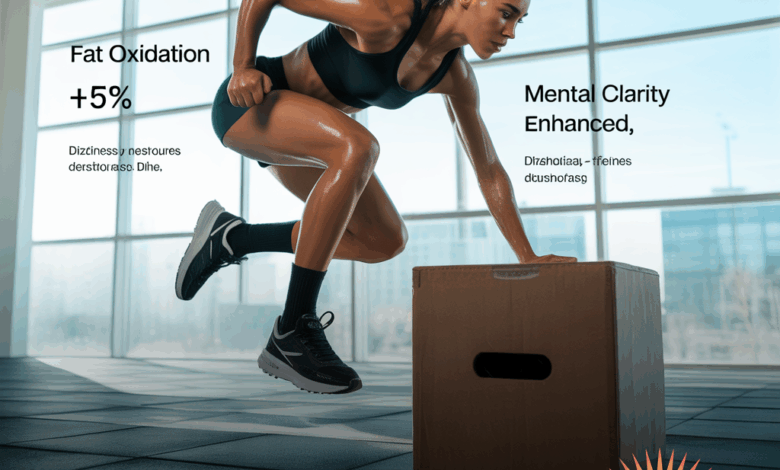Pre Workout On An Empty Stomach Benefits And Risks

Ever stood in the gym doorway at 6 a.m., wondering if a shot of pre-workout and an empty stomach will make you crush your workout — or send you dizzy to the mat? Training fasted is trendy, but mixing stimulants, amino acids, and caffeine with no pre-exercise meal raises questions. In this article we break down the science, real-world pros and cons, and give practical tips so you can decide whether a pre workout on an empty stomach is right for you.
Introduction: The Fasted Workout Dilemma
“Pre workout on an empty stomach benefits and risks” is a common search because many gym-goers want maximum energy and fat-burning without feeling bloated. Fasted training can offer advantages like increased fat oxidation and convenience, but there are downsides such as stomach upset, jitters, and reduced performance for some. Below you’ll find a balanced, evidence-informed look at both sides plus actionable guidance you can apply today.
What Happens When You Take Pre-Workout Fasted?
Taking a stimulant-based pre-workout on an empty stomach often leads to faster absorption of ingredients like caffeine, beta-alanine, and citrulline. That can mean quicker onset of energy and focus. However, it also increases the chance of side effects: nausea, acid reflux, lightheadedness, or racing heart. Your individual tolerance, the product formula, and the intensity of exercise all matter.
Physiological effects
- Increased adrenaline and alertness from caffeine.
- Faster gastric emptying may cause a sudden spike in stimulant levels.
- Greater reliance on fat stores during low-to-moderate intensity exercise.
Benefits of Taking Pre-Workout on an Empty Stomach
Here are common advantages reported by athletes and supported by some research and user experience:
- Improved focus and energy: Faster caffeine absorption can sharpen concentration for early workouts.
- Enhanced fat-burning potential: Low glycogen states can encourage the body to burn more fat during steady-state cardio.
- Convenience: No need to wait for digestion — ideal for busy mornings.
- Reduced stomach fullness: Avoids the discomfort of exercising on a heavy pre-workout meal.
Risks of Pre-Workout on an Empty Stomach
There are legitimate risks you should weigh before making fasted pre-workout a habit:
- Gastrointestinal distress: Ingredients like caffeine and citric acid may irritate an empty stomach.
- Increased anxiety or palpitations: Higher stimulant concentration can cause jitters for sensitive individuals.
- Reduced lifting performance: For heavy resistance training, low glycogen may limit strength and power.
- Hypoglycemia symptoms: Lightheadedness, sweating, or fainting in predisposed people.
Who Should Try Fasted Pre-Workout — And Who Shouldn’t
Fasted pre-workout is not one-size-fits-all. Consider these guidelines:
- Good candidates: experienced exercisers doing cardio or moderate-intensity sessions, people seeking convenience, those tolerant to caffeine.
- Not recommended for: beginners, people with cardiovascular issues, those prone to low blood sugar or anxiety disorders, and anyone doing maximal strength or explosive training.
Practical Tips for Using Pre-Workout on an Empty Stomach
Follow these tips to reduce risk and improve outcomes:
- Start with half a serving of pre-workout to test tolerance.
- Prefer formulas with lower stimulant content early in the morning.
- Hydrate well — sip 300–500 ml (10–17 oz) of water before dosing.
- Time your dose 20–30 minutes before exercise for most stimulant-containing products; adjust based on how quickly you feel effects.
- If you feel dizzy or nauseous, stop and have a small carbohydrate snack (banana, slice of toast) and rest.
Substitutes and milder options
- Black coffee (low cost, low calories, moderate caffeine).
- BCAAs or EAAs for those worried about muscle breakdown during fasted training.
- Non-stimulant pumps (citrulline-only blends) for workouts where focus isn’t the main goal.
Workout Variations and Real-World Examples
Choose your session type based on goals and how your body responds to fasted pre-workout.
Best for fasted pre-workout
- Steady-state cardio: 30–45 minutes of jogging, cycling, or brisk walking for fat oxidation.
- Low-to-moderate intensity circuit training: keeps glycogen demand moderate while maintaining calorie burn.
Avoid fasted pre-workout for
- Heavy resistance training days: if you’re aiming for 1–5 rep maxes, eat a small meal 60–90 minutes beforehand.
- High-skill sports or Olympic lifts: require maximal power and stable blood sugar.
Real-world example: Sarah, a 28-year-old runner, uses half a scoop of a low-caffeine pre-workout before morning intervals and notices better focus without GI upset. Marcus, a powerlifter, tried a full-dose pre-workout fasted and experienced palpitations — he switched to a light carb snack plus a pump-focused formula and regained performance.
Healthy Lifestyle Tips to Combine with Fasted Training
- Prioritize sleep: poor sleep increases sensitivity to stimulants and reduces recovery.
- Maintain consistent meals around training windows — emphasize protein within 1–2 hours after training to support recovery.
- Monitor caffeine intake across the day to avoid sleep disruption.
- Track how you feel and log performance — objective notes guide better decisions than marketing claims.
For structured program ideas and sample schedules, check out our workout routines and nutrition guides pages.
Frequently Asked Questions
Short answer: possibly for low-to-moderate intensity cardio. Fasted states can increase fat oxidation during exercise, but total fat loss depends on overall calorie balance and training consistency.
Safety depends on the formula and your tolerance. Daily stimulant-heavy use can increase tolerance, disrupt sleep, and raise heart rate. Rotate products, limit caffeine, and include stimulant-free days.
Stop exercising, sit or lie down, drink water, and eat a small carbohydrate snack (fruit, sports drink) if symptoms persist. If severe symptoms occur (chest pain, fainting), seek medical help.
Conclusion
Deciding whether a pre workout on an empty stomach benefits and risks you personally requires experimentation, awareness, and sensible pacing. For some, fasted pre-workout offers convenient energy and mild fat-burning advantages; for others it leads to GI upset, jitters, or reduced performance. Start small, listen to your body, and match your strategy to the workout type. Want more tailored advice? Explore our wellness tips to optimize training, nutrition, and recovery — and try a trial week to see how your body responds.
Ready to put this into practice? Test one change this week: half-dose your pre-workout before an easy cardio session and keep a short log of how you feel and perform. Adjust from there and make fasted training work for you.





